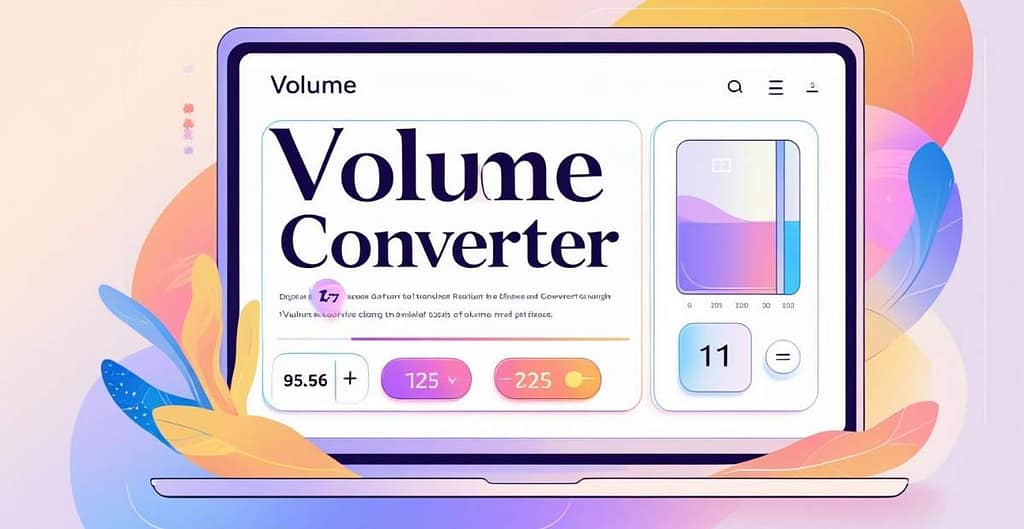Volume Converter
Instantly convert between different volume measurement units with our free online tool. Accurate, easy-to-use, and mobile-friendly.
Volume Conversion Tool
Popular Volume Conversions
Quickly convert between these commonly used volume measurements:
Volume Conversion Table
| From | To | Multiply by |
|---|---|---|
| Liters | Gallons | 0.264172 |
| Gallons | Liters | 3.78541 |
| Milliliters | Cups | 0.00422675 |
| Cups | Milliliters | 236.588 |
| Fluid Ounces | Milliliters | 29.5735 |
What is a Volume Converter?
A Volume Converter is an essential tool that allows you to convert measurements from one unit of volume to another. Whether you’re cooking, mixing drinks, working on science experiments, or dealing with liquid measurements in any context, our volume conversion tool provides accurate results instantly.
Why Use Our Volume Conversion Tool?
Our online Volume Converter offers several advantages:
- Accuracy: Get precise conversions every time with our reliable algorithm
- Convenience: Convert between multiple units without complex calculations
- Time-saving: Instant results eliminate manual calculation errors
- Free to use: No registration or payment required
- Accessibility: Works on all devices – desktop, tablet, and mobile
- Comprehensive: Supports both metric and imperial volume units
Common Volume Units and Their Uses
Metric System Units
The metric system is used worldwide for scientific and everyday measurements:
- Milliliters (ml): Used for small liquid measurements like medication or cooking ingredients
- Liters (L): Standard unit for beverages, gasoline, and larger liquid quantities
- Cubic Centimeters (cc): Often used in medical and automotive contexts (equal to milliliters)
Imperial System Units
Commonly used in the United States and for some specific applications:
- Teaspoons (tsp) and Tablespoons (tbsp): Primarily used in cooking and baking recipes
- Fluid Ounces (fl oz): Used for beverage containers and some cooking measurements
- Cups: Common in cooking, especially in American recipes
- Pints (pt): Used for beverages like beer and milk
- Quarts (qt): Often used for liquids like motor oil or larger cooking quantities
- Gallons (gal): Standard for larger volumes like fuel, milk, and water
How to Use Our Volume Converter Tool
Using our Volume Converter is simple and straightforward:
- Enter the numerical value you want to convert in the input field
- Select the unit you’re converting from (e.g., liters, gallons)
- Select the unit you want to convert to (e.g., milliliters, cups)
- Click the “Convert Volume” button or let the tool convert automatically as you type
- View your instant conversion result displayed clearly below the converter
Practical Applications of Volume Conversion
Volume Converters are useful in many scenarios:
- Cooking and baking: Converting recipe measurements between metric and imperial systems
- Bartending: accurately measuring cocktail ingredients that may use different measurement systems
- Science experiments: Converting between measurement systems for precise laboratory work
- Automotive maintenance: Converting fluid volumes for oil changes, coolant replacement, etc.
- International commerce: Understanding product volumes from global suppliers
- Education: Helping students understand measurement systems and conversions
Frequently Asked Questions About Volume Conversion
How do I convert liters to gallons?
To convert liters to gallons, multiply the liter measurement by 0.264172. For example, 10 liters equals 2.64172 gallons. Our Volume Converter automates this calculation for you.
What is the formula to convert gallons to liters?
To convert gallons to liters, multiply the gallon measurement by 3.78541. For instance, 5 gallons equals approximately 18.9271 liters.
How many milliliters are in a cup?
There are approximately 236.588 milliliters in one cup. This conversion is especially important for cooking and baking measurements.
What’s the difference between fluid ounces and weight ounces?
Fluid ounces measure volume, while weight ounces measure mass. They are different measurement types and cannot be directly converted without knowing the density of the substance.
Is the Volume Converter tool accurate for all liquids?
Yes, our Volume Converter uses precise conversion factors to ensure accurate results for all your measurement conversion needs. However, note that these conversions are for volume only and don’t account for density variations between different liquids.

Use our more free tools at earnapki
Weight Converter tool
Length Converter
Area Converter tool
Use perfect QR Code Generator tool For business